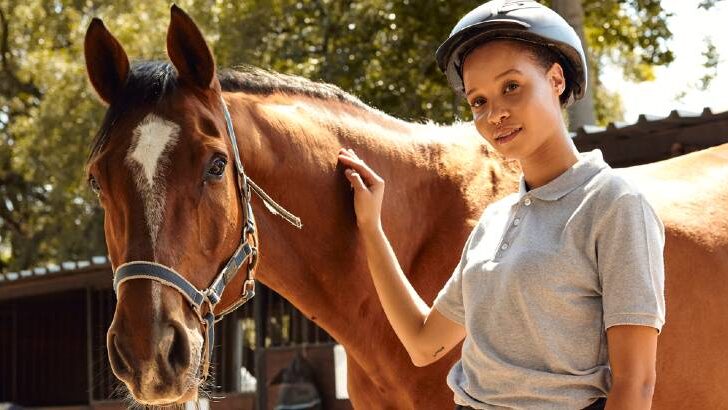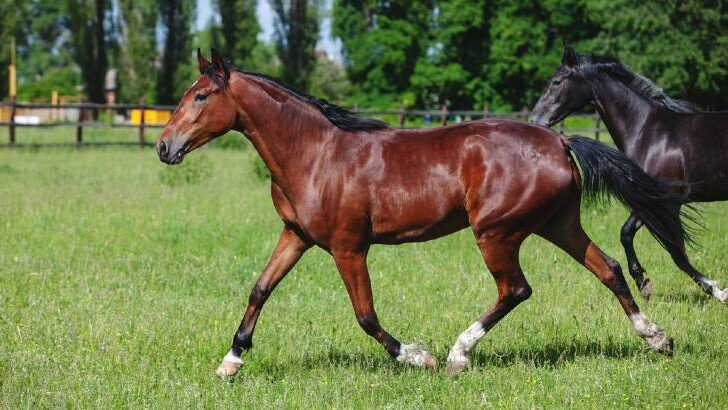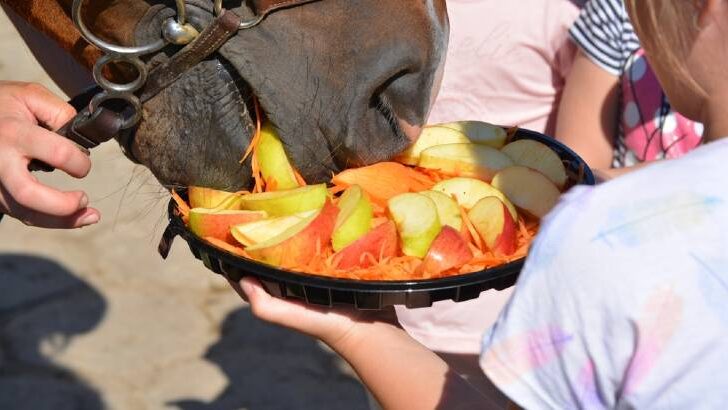Affiliate Disclaimer
As an Amazon Associate I earn from qualifying purchases. It helps me keep the website going. Thank you for your support.
Horse riding is known for giving people a sense of freedom, and is a lifelong passion for many. It is also a great form of exercise. Like us, horses require regular exercise too. But how often should you ride your horse? Do they need daily riding, just like a dog should be taken for a daily walk?
There is no set answer to how often you should ride your horse. The answer depends on what activities you like to do with your horse. It also depends on the age and skill level of your horse, along with your management practices. Additionally, being ridden is not the only way to exercise a horse.
Horses are very athletic animals, who require regular exercise to maintain good health. Read on to learn more about deciding on the right level of exercise for you and your horse.
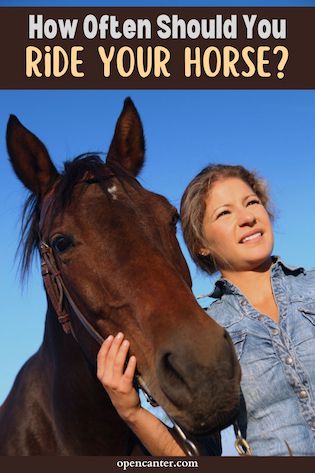
What Are The Different Levels of Work for Horses?
Horse owners often refer to one of four levels of work that their horse is in. This gives a standard indication of how many times a horse is ridden each week. The level of work is also used to decide what feed to give the horse.
These levels are light, medium, heavy, and intense. In light work, the horse does about one to three hours per week, mostly walking and trotting. Medium work consists of being ridden between three and five hours a week and usually adds other skills like jumping.
Horses in heavy work do a similar number of hours per work, between four to six. However, they are ridden at faster paces for longer, and do more skill work at a higher level. Intense-level work is usually only seen in high-level eventers, endurance horses, or racehorses. Each week, they might do an hour or two of speed work and between six and 12 hours of slow work. (source)
How Often Should You Ride Your Horse in a Week?
The answer to this question depends on what you and your horse do together. Certain activities require more training and fitness than others. It also depends on whether your horse is kept in a field or stabled.
For example, the horse who goes on weekend trail rides doesn’t need to be as fit as an Olympic eventer. The trail-riding horse will stay fit enough with one to three 20-minute rides per week. The Olympic eventer may be ridden up to six times a week, perhaps up to 45 minutes a session.
Additionally, the trail riding horse only requires basic education. On the other hand, the eventer needs to be skilled at dressage, showjumping, and cross country. Additionally, they need to be very fit to handle the demands of the competition.
Management practices also change how much exercise your horse needs. Horses kept in large fields will exercise themselves, by moving around to graze. They may also run and play with their field mates. On the other hand, horses who are kept in small fields or stables cannot exercise themselves.
Therefore, stabled horses require more work to maintain the same level of fitness as paddocked horses. However, the extra exercise does not have to include being ridden. It can incorporate other things like lunging or the use of a horse walker.
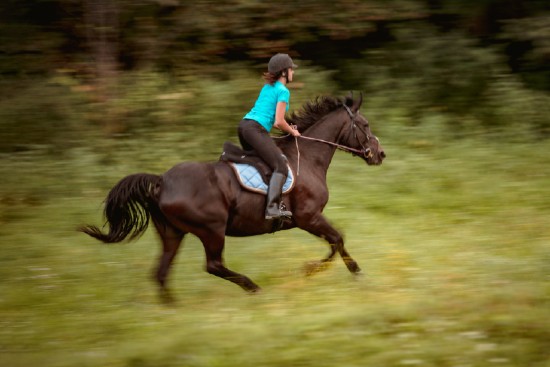
How Long Should I Ride My Horse Each Time?
Once again, the answer to this depends on what activities you do with your horse. It also depends on you and your horse’s fitness level.
Horses in light to medium work may only do sessions that are between 20 and 30 minutes long. This length of time is long enough to maintain condition and training. Extra fitness can be added by increasing the amount of work done at faster paces.
Horses in heavy work may do sessions from 30 minutes to an hour. The session length depends on the activity. For example, a top-level dressage horse may do a 30-minute arena session, four times a week. On the other three days, it does an hour of trail or hill work and has a rest day. An eventer may do 45-minute dressage sessions but may do up to a 90-minute session of cross-country training.
Most horses benefit more from regular, shorter sessions than irregular long sessions. This is because horses learn through repetition. It is difficult to achieve enough repetition if you only do one weekly session. Additionally, if that one session is four hours long, you greatly increase the risk of injury due to fatigue.
For example, if you start running and do a long first session, you will likely be very sore afterward. If you only do one session a week, you will still pull up sore after each session. This is because one big session a week is not regular enough to condition your muscles.
Alternatively, you start with a short session and repeat those short sessions every second day. You won’t be as sore after each session, and over time can increase the intensity without risking injury.
Do Horses Need Days Off?
Just like humans, horses certainly need days off. This is to allow time for their muscles to recover and to avoid injury from fatigue. Additionally, it helps to give the horse a mental break from being ridden.
The number of days horses need off depends on their fitness level. A horse who is young or just being brought back into work needs every second day off. The riding day works on building the muscles, and the rest day gives time for the muscles to repair.
Horses in medium to heavy work have fewer days off but are also fitter and more conditioned. Additionally, they usually do different kinds of work each day. This prevents the horse from becoming bored and sour.
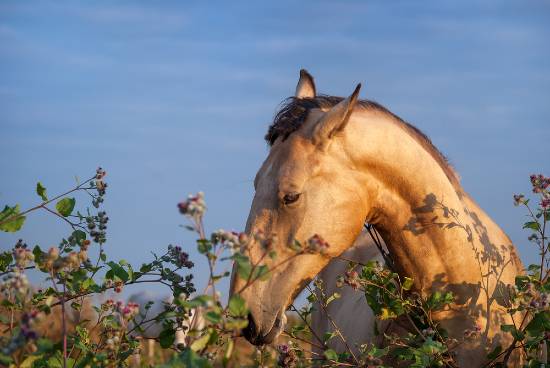
How Much Exercise Is Too Much Exercise?
Horses are very athletic animals and can achieve very high levels of performance. However, they are not machines and need rest to recover.
The amount of exercise a horse can handle before becoming exhausted varies. A very fit horse will be able to handle a lot more exercise than an unfit one. However, the exercise must be the same type the horse has been conditioned to.
For example, an elite eventer will be fit enough to handle a long jumping session. However, they will not last long pulling a heavy cart. This is because the muscles required for jumping are different from those required for pulling heavy loads.
Most horses can handle being ridden for up to 30 minutes with no issues. Provided they are not trotted or cantered for the entire time, they are unlikely to become sore. Regular walk rest breaks are key, along with using correctly fitted gear.
Can I Exercise My Horse Without Riding?
You don’t have to ride your horse to exercise them. There are many different forms of exercise that horses can do that do not involve being ridden. Additionally, horses kept outside in the field will exercise themselves. This is why it is important that horses are kept in an area large enough for them to move around.
Doing groundwork with your horse is a great form of exercise. There are many different types of groundwork. These include hand-walking, long-lining, and lunging.
Hand-walking
Hand-walking involves simply taking your horse for a walk. You may take them on a walk around the property, or lead them along a trail. It is also a good way to introduce your horse to new environments.
Hand-walking is also a recommended form of exercise for horses recovering from injury. This is because it is a low-intensity form of exercise. The horse is under the control of the handler and is much less likely to injure itself. There is also the added benefit that it helps get you fit too!
Long-Lining
Long-lining is a form of exercise in which the handler controls the horse via two long ropes. Each rope is connected to the bit on the bridle and becomes extended reins. This form of exercise can be a great way to teach young horses how to steer and stop, before riding. It can also be useful when teaching horses to pull carriages or carts.
Lunging
Lunging is a higher-intensity form of exercise. The handler uses a lunge lead, and a whip, to ask the horse to circle around them. The horse can circle at walk, trot, and canter. Some people even lunge their horses over poles or jumps.
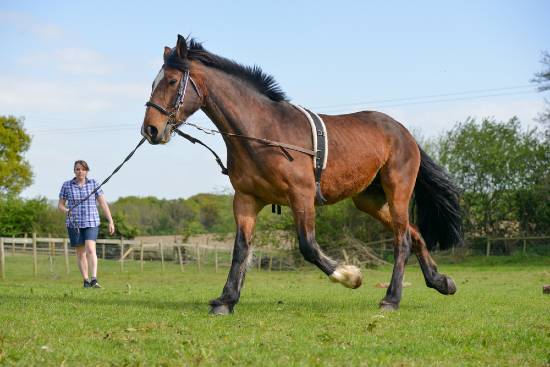
Lunging can be a useful technique to use up extra energy before the horse is ridden. However, excessive lunging, especially at faster paces, should be avoided. This is because it can be hard on a horse’s joints and muscles.
There are also machines and facilities designed to exercise horses. These include horse walkers, treadmills, and water walkers or pools. These facilities are usually only used by horses recovering from serious injury, or those in heavy to intense work. They are expensive to install and require maintenance.
Final Thoughts
The question, ‘How often should you ride your horse?’ is not one with a straightforward response. The answer will depend on your goals for you and your horse, along with their age and skill level. Finding the right balance to achieve your goals yet avoid injury takes careful consideration.

